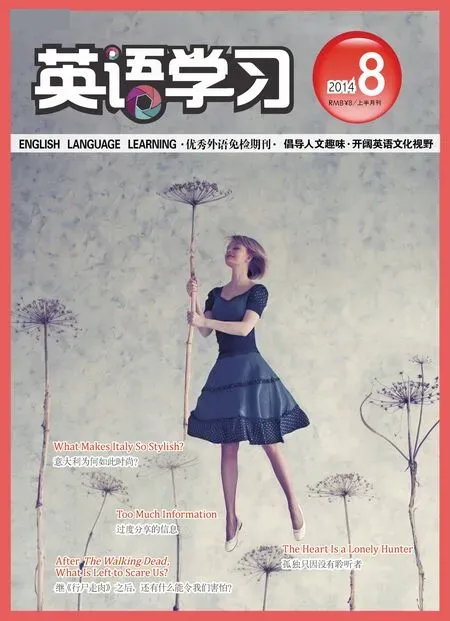日本人的“送礼”
2014-12-17林巍
∷林巍 文/译
原 文
[1]日本人特别爱送礼,从生育、生日、结婚、探病、搬家、过节等等,几乎从未间断。日语中的“礼物”写作“土产”,即各地的特产。这从一个侧面反映了日本人的团体意识;以此来联络人际感情,分享体验,互表祝愿。
[2]日本人送礼物的意义不在于其价值,而在于其时间、场合和方式。而且,日本人很注重礼物的包装,因为这代表了对收礼人的尊敬。这与中国人不同;中国人更注重礼物本身的价值。
[3] 在日本时,一次分别之际,主人分别送了我们三位每人一份从包装上看是非常贵重的礼物,打开一看,原来是一块手绢。这一点也不表明他的小气,因为礼物是在此时此刻给的,而且已在包装上给与了我们足够的尊重。
[4] 日本人在送礼物时,总不忘加上一句:“不是什么好东西”,哪怕心理觉得的确是好东西。这一点,倒很像中国人。我在澳大利亚时却完全不同,他们会把要送礼物的价值如实告诉你;如果是花费时间自做的,那更会把其中的周折讲出来,唯其如此,才更显出对你的尊重。
[5] 送礼的数目,日本人喜欢的是单数,这与中国人“成双成对”的文化又大不相同。但也有相同之处:中国人一般不送梨,因为其有“分离”之意;日语中的“梨”发音与“无し”相同,为“没有”之意。再有,“四”数在日本人的送礼中也是避忌的。
[6] 总之,日本人的送礼文化有着其浓郁的特色;既有别于中国更不同于西方,而是其独特土壤的产物。
译 文
[1] The Japanese love presenting gifts on various occasions, such as child bearing, birthday, marriage, visiting a patient, moving, festivals … the list goes on. “Miyage”written in Japanese as “gift”, referring to specialties in various locations. Presenting gifts partially re flects Japanese group consciousness, in the way affections can be assured,experience shared and good wishes conveyed.
[2] In Japanese gift presenting, the value of the gift is not as important as its timing, the occasion and the ways of presenting it, for they are carrying much weight of the presenter. Also, packing is much valued by the Japanese as showing respect to the recipient. In contrast,the Chinese probably regard the gift itself as more valuable.
[3] In Japan, in a farewell meeting, the Japanese host presented glamorous gifts to three of us. When we opened the gorgeous packing, only a plain handkerchief appeared, however, given the timing, occasion and packing, the gifts actually carried enough weight and generosity to the guests.
[4] Gift-presenting is normally accompanied by the Japanese way of depreciation—“It’s a mere tri fle”, although it may be worth a lot in their minds. In some way, this is very much like the Chinese, but nothing like westerners, such as Australians.When we were in Australia, people gave us presents, and they don’t mind revealing the values of the gifts and the time they spent on them, just to show their sincerity.
[5] Unlike Chinese, who will always present something in pairs, the Japanese prefer odd numbers. Nevertheless, there is something in common between Japanese and Chinese, such as avoiding the same character “梨” (li),which means “departing” in Chinese and “nothing” in Japanese respectively; “四”(si / shi) is homonymic to “死”(si / shi), literally means “death” both in Chinese and Japanese, and so on.
[6] In short, the Japanese gift-presenting culture is deeply rooted in its unique soil, and distinguishingly different from both Chinese and western cultures.

译 注
在[1]中,“……特别爱送礼,从生育、生日、结婚、探病、搬家、过节等等”, 意为喜欢在……场合送礼,故 on ... occasions 置前,之后分述;“几乎从未间断”,此处没用almost never ends / on a constant basis 等,而用了... the list goes on,也不失为一种表述方式。日文的“土产”,基本意思为“各地的特产”,其实也不只是特产,有“特定含义的礼物”之意;“团体意识”,英文不妨为group consciousness;“联络人际感情,分享体验,互表祝愿”,显出中文对称、工整的特点,译为英文时可作适当变通:...in a way affections can be reassured, experience shared and good wishes conveyed. 英国著名哲学家培根(Francis Bacon) 曾写过类似的句子:Reading makes a full man; conference a ready man;and writing an exact man (读书使人充实,讨论使人机智,笔记使人准确)。
在[2]中,“送礼物的意义”, 这里的“意义”不一定是meaning, 而实为value;“……不在于其价值,而在于其时间、场合和方式”, 可用比较句式...is not as... as... ;“很注重礼物的包装”,亦不一定pay much attention to packing, 而用了packing is much valued by... , 以更显其意。
在[3]中,“打开一看,原来是一块手绢”,When we opened..., a plain handkerchief appeared, 是对当时进行状态的一种描述;“这一点也不表明他的小气,因为礼物是在此时此刻给的,而且已在包装上给与了我们足够的尊重”,不必逐字译出(如“小气”等),而需重点把握其意,即突出“时机”和“尊重”, 而此处的“尊重”不是一般意义上的respect,revere, esteem 等,而是表达其中的“分量”,故不妨为carry the weight, 整句为 Given the timing, occasion and packing, the gifts actually carried enough weight and generosity to...。
在[4]中,口语的“不是什么好东西”,而英文又不一定为 not goodthing, 而可为 nothing valuable, 但有略显正式,故不妨为 It’s a mere tri fle.“倒很像中国人”, 若译为 this is analogous to the Chinese mind, 颇有书卷气,故可简化为this is very much like the Chinese.“澳大利亚……不同,……唯其如此,才更显出对你的尊重”,其中的“澳大利亚”译为了Australians (澳大利亚人),并在其前增加了but nothing like westerners, such as... 以显出两种文化间的对比;“尊敬”,此处也未用respect, 而是 sincerity。
在[5]中,“日本人喜欢的是单数,这与中国人‘成双成对’的文化又大不相同”, 此句的翻译采用了倒装句,即将unlike Chinese who will always present something in pairs提前,而其后的中日文词汇的“相同之处”,则不妨标示出彼此的汉字,并加以注音,以更明确。
在[6] 中,可将其词序、结构调节、整合,即突出“其独特土壤的产物”,而“产物”亦未必按字面意思译出,可以动词处理 ...is deeply rooted in its unique soil,而将“既有别于中国更不同于西方”置后处理——distinguishingly different from both Chinese and western cultures,以更符合英文的表述方式。
